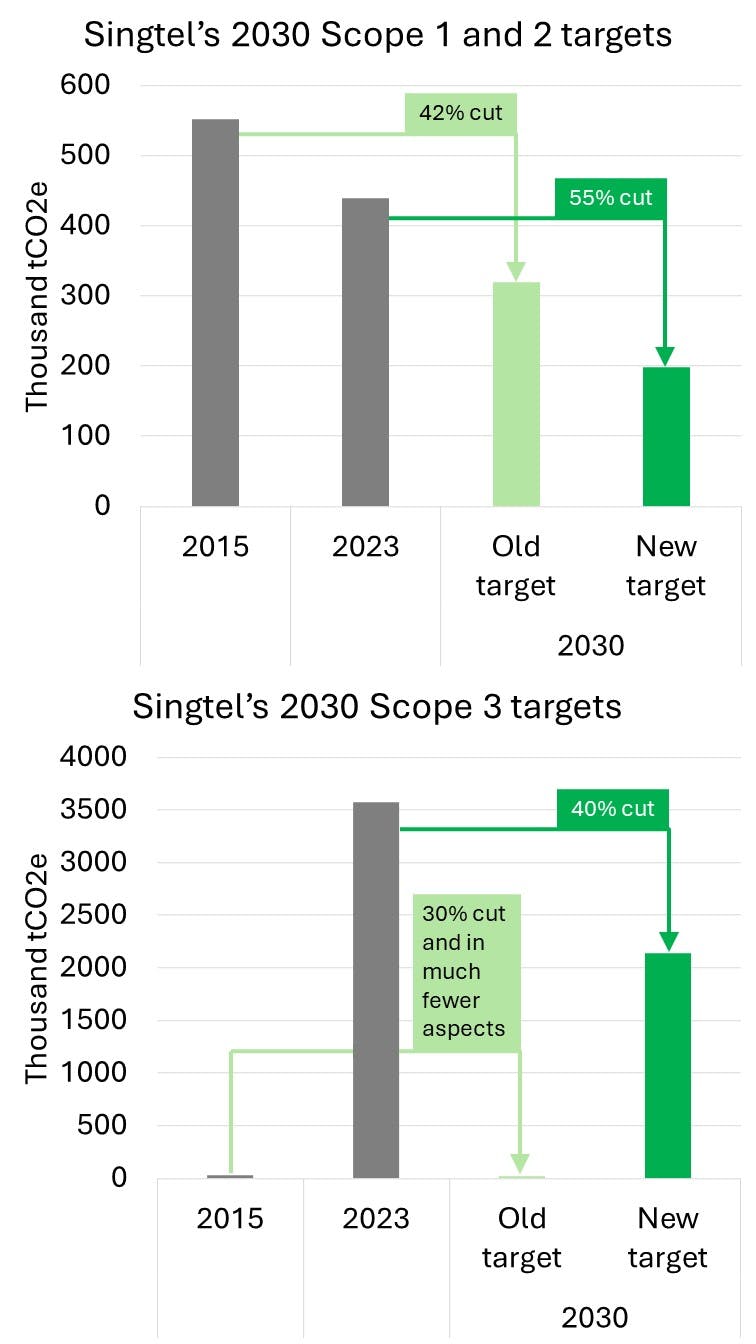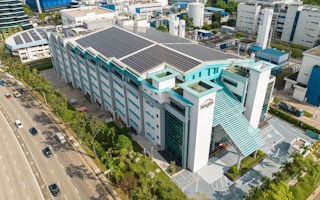Singtel Group, one of the largest listed companies in Singapore, has updated its interim sustainability targets for 2030 months after vowing to hit net-zero emissions by 2045.
To continue reading, subscribe to Eco‑Business.
There's something for everyone. We offer a range of subscription plans.
- Access our stories and receive our Insights Weekly newsletter with the free EB Member plan.
- Unlock unlimited access to our content and archive with EB Circle.
- Publish your content with EB Premium.
The firm is now committing to slash Scope 1 and 2 emissions, from its internal operations and power consumption, by 55 per cent by 2030, compared to 2023 levels. It will also strive for a 40 per cent reduction in Scope 3 third-party emissions, which includes those from its purchases, investments and use of sold products, over the same period of time.
The commitments have been validated by global sustainability pledge checker Science Based Targets initiative (SBTi). Singtel had received SBTi endorsement in 2017 for an earlier set of goals, and the firm says it is the first telecommunications firm in Asia to renew such targets.
In its previous 2030 targets, Singtel pledged to reduce Scope 1 and 2 emissions across its Singapore and Australia operations by 42 per cent, and Scope 3 by 30 per cent, referencing a 2015 baseline.
Singtel said its 2045 net-zero goal, brought forward from 2050 last July, has also been adjudged by SBTi to be “closely aligned” with the certifier’s most stringent criteria.
Companies approach SBTi to verify that their sustainability targets align to a clear emissions reduction pathway towards limiting global warming to 1.5°C above pre-industrial levels, which scientists say is a safety threshold for climate risks.
Singtel Group chief executive Yuen Kuan Moon said the firm’s second set of SBTi-approved targets are “aggressive goals”.
“We firmly believe that we can pursue business growth while safeguarding our planet for future generations,” Yuen said.
SBTi chief executive Luiz Amaral said that “Singtel’s net-zero targets match the urgency of the climate crisis and set a clear example that their peers must follow”. Singtel said it is the only Asian telco with a net-zero target set ahead of 2050.
Updates from 2017

Singtel has pledged updated 2030 decarbonisation targets, which will see a steeper drop in Scope 1 and 2 emissions, as well as a vastly broader range of third-party emissions covered under Scope 3. Data: Singtel’s 2015 and 2023 sustainability reports.
Singtel has slashed its Scope 1 and 2 emissions by over 20 per cent since its first round of SBTi-validated targets.
The latest target would get its emissions down to about 197,500 tonnes of CO2-equivalent in the two emission categories by 2030, whereas the previous pledge would result in a higher 320,000 tCO2e, according to Eco-Business calculations made from data in Singtel’s sustainability reports.
Singtel’s new Scope 3 pledge is harder to compare to its earlier iteration. The firm’s reported Scope 3 emissions were just over 31,000 tCO2e in the financial year 2015 – its earlier baseline – tabulated from a limited dataset of its contractor fleet, air travel, employee commute and retail franchises.
But the new 2023 baseline for Scope 3 includes several more emission sources, such as the group’s investments, purchases, capital goods and downstream use of sold products. As such, the figure reported in 2023 is 100 times higher than 2015, at over 3,568,000 tCO2e.
While Scope 3 represented 5 per cent of Singtel’s total emissions in 2015, the category ballooned to nearly 90 per cent of total emissions, with the more comprehensive reporting in 2023. The company is therefore now working to reduce a much larger and more complex range of third-party emissions.
Work in progress
Singtel said it focuses on reducing energy consumption, improving energy efficiency and using renewable energy sources to reduce its carbon footprint. Yuen said staff are developing “comprehensive plans” to achieve its new 2030 sustainability targets.
The telco has invested nearly S$150 million (US$112.80 million) since 2015 in carbon-cutting measures including using machine learning to optimise network energy usage, procuring renewable electricity, upgrading chillers, recycling electronic waste, deploying solar panels and using electric vehicles.
The firm is also redeveloping its Singapore headquarters to be carbon neutral, and building green regional data centres, it said, adding that it is getting supply chain partners to increase their disclosures and take more climate action.
Singtel operates in Asia, Australia and Africa, and has over 760 million mobile customers. It owns Optus, Australia’s second-largest telco. Singtel posted S$2.23 billion (US$1.68 billion) of net profit in its last financial year.
The telecommunications industry produces about 2 per cent of total global emissions, from the huge amount of electricity it consumes to churn and store data. Without interventions, emissions could continue rising from growing demand for data-intensive services such as video streaming.

















